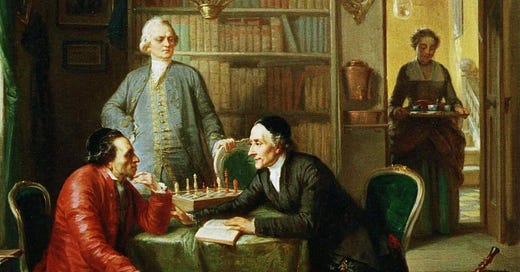Slow Read: Books of Jacob, chapters 19-21
The Book of the Comet: "what would happen if hate could transform into a plague?"
Welcome to the Slow Read Along of Olga Tokarczuk, The Books of Jacob. You read along at your pace, and I guide you through the story, characters, and rich historical and cultural context.
This week, IV The Book of the Comet, Chapters 19 to 21. We meet Asher Rubin, the kindly, enlightened Jewish doctor. We watch hate transform into a plague after Jacob Frank converts to Christianity and smears his fellow Jews with the blood libel.
The Books of Jacob was book 52 in my unordered list of 100 Books to Read Before it is Too Late. I hope you come to love this book as I do.
Olga Tokarczuk won the Nobel Prize in Literature in 2018.
Critics described The Books of Jacob as a “decade-defining book.”
Special Note for New Readers and Subscribers
You can check back and catch up on the whole Slow Read of The Books of Jacob, with hyper-linked lists of all posts, profiled characters, and guides on my Slow Read page.
If you are checking in on the Slow Read of The Books of Jacob for the first time, check these guides to this brilliant novel, the best historical fiction of the twenty-first century, in my humble opinion.
13 January - Tips on how to do the 'slow read' of The Books of Jacob
20 January - An overview of the characters of The Books of Jacob
27 January - Historical context of the 'Other Europe' in The Books of Jacob
The Story: Book of the Comet, Chapters 19 to 21
These three chapters begin with the appearance of Halley’s Comet on March 13, 1759 “upending the order of the sky.” To some the star portends cosmic change, but Yente is more interested in the “countless humble human things that make up the warp of the world.” Those humans will endure crisis, conversion, and catastrophe over the next three chapters. The Utopian community of Frankists in Ivanie will move to Poland, convert to Christianity, calumny their former co-religionists, and flee from a catastrophe of plague, illusions, and hatred.
In Chapter 19 there are fourteen sections that focus on the life of the Frankist community in Ivanie while its leaders and representatives negotiate with the Polish nobility and the Catholic church. They seek an agreement that can secure an independent communal life in exchange for a high-profile conversion to the Polish Catholic faith. Will the price be too high? And will the converts, even after they adopt Christian Polish names, truly let go of their heretical beliefs and scandalous practices?
The appearance of the comet lends weight to Jacob’s preaching in Ivanie about the arrival of the Messiah in the form of the Everlasting Virgin or Shekhinah. Nahman talks with his old teacher, Yankiel of Glinno, about how Poland’s Jews are responding to Jacob’s sect. Kossakowska and Moliwda correspond about negotiations with the Church for a mass baptism. In the village, Nahman observes the multi-partner sex among the believers and how they are seeking to break old laws so new laws can appear. Laws are broken in sensuous ceremonies and identities are remade in the adoption of Polish Christian names.
Pinkas listens to the Rabbi’s preparations for the disputation with Jacob’s Sabbatians and searches for his daughter, Gitla. Believing that she may be in Ivanie, he travels to the town. There, he is told that she has not been seen for more than a year. Moliwda writes to Katarzyna Kossakowska to say that the Contra-Talmudists are already coming into Lwów en masse with unreasonable hopes. He warns Jacob not to test the Christian rulers.
“He tells them that all over Podolia this celestial body has generated great anxiety, and many people have insisted that it augurs a great plague and pogroms, as in Khmelnytsky’s day. And famine, too, and an impending war with Frederick Augustus. Everyone agrees the Last Days are coming.”
(Books of Jacob, p. 485)
In Chapter 20 there are sixteen sections that take us through the disputation in Lwów Cathedral, in which the Frankists accuse the Jews of ritual sacrifice of Christian children. Moliwda speaks on behalf of the Contra-Talmudists. The Talmudists present their case meticulously but confront the growing hatred of the crowd. The Church make accusations of the practice of blood sacrifice. In the audience, Pinkas is so astonished by the absurdity of the claims that he confronts Moshe. He is dragged away by the guards. It creates an uproar that suspends the case for three days. When the disputation resumes, chief Rabbi of Lwów, Rapaport condemns the spiteful blood libel and explains how it is justified by deliberate mistranslations of Hebrew. The court rules in favour of the Contra-Talmudists, but does not support their claim that Jews consume Christian blood.
They convert and believe for a time that a Utopia will come - “Everything is going to be different.” There is a refugee crisis. Amid these dramatic consequential events, the sad search of Pinkas for his daughter Gitla continues. He learns that she lives with Asher and is caring for the refugees of Poland. We discover a whole family of Frankist Christian converts, the Mayorkowiczes. For a while they are inspired. But the mood shifts quickly. Chmielowski is seen presenting his New Athens in Lwów. After the baptism Jacob changes his appearance. His wife Hana is shocked.
“He thinks of Pinkas, his sort-of father-in-law, and he wonders what would happen if hate could transform into a plague. Is that how herem works? Asher often sees how a cursed person quickly becomes defenseless, weak, ill, and when the curse is taken off him, he gets well.”
(Books of Jacob, p. 409)
In Chapter 21 there are only six sections. They deal with the catastrophe that followed the conversion. A plague or cholera comes to Lwów, and the brief enchantment with the Frankists ends. They are blamed for the disease and attacked. Asher and Gitla flee for Vienna, but not before seeing Jacob’s delusional faith-healing fail. Jacob himself flees and is protected by Moliwda in Warsaw. But with his “inexplicable self-confidence” still intact, he is irritated by those who begin to doubt his messianic leadership. In front of his followers he is defiantly arrogant. He accuses them Do “you forget who I am”? But with the Polish nobility he fawns. At Radziwill’s estate the one surviving Mayorkowicz is married to a much older Frankist. Nahman observes:
No one is immune from acting differently with someone positioned higher than himself than with someone situated lower. The whole world depends on this dynamic, and this hierarchy is deeply ingrained in men.”
(Books of Jacob, p. 394)
But the attacks on the Frankists continue. The disease takes its toll. Reb Mordke dies, the first major follower of Jacob to be lost. Nahman’s friend, mentor and fellow student with the Besht is lost. Nahman’s seeds of doubt about Jacob are planted deep inside his manuscript, Scraps, but still he observes there is “something wonderful about being a stranger.”
Question for Readers
The Books of Jacob reflects often on the false hopes, utopian beliefs and dreams of escaping history through revolution or revelation. When all the pilgrims arrive in Lwów, their faith in a new beginning cloaks their difficult, vulnerable circumstances.
Dusty and tired, they exchange news and offer one another simple food. They don’t need anything other than water and a piece of bread to tide them over until the great event. When you think like that, a person doesn’t want much in order to live. He doesn’t even have to eat every day. What does he need combs, ribbons, clay pots, sharp knives for, when the world is about to be totally transformed? Everything is going to be different, although no one can say how. That’s what they are all talking about.
Books of Jacob, p. 435
QUESTION FOR READERS:
How have you observed people get carried away by a belief that “everything is going to be different” (this time) because of a charismatic leader or an emotionally resonant idea?
Below the paywall I have some additional notes for paid subscribers on:
Character - Asher Rubin
Context - the Frankists’ 1759 conversion, blood libel and Hasidism.



